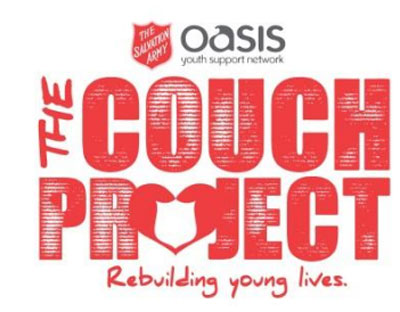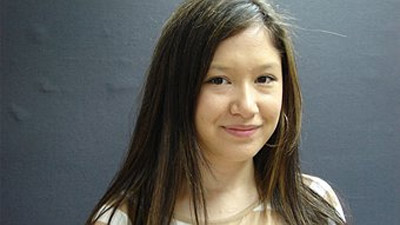The Couch Project

The Couch Project
Launching on Youth Homelessness Matters Day, The Couch Project aims to raise awareness about youth homelessness in Australia with an emphasis on the hidden issue of couch surfing.32000 young Australians are homeless, 14000 of these are living on the couches of friends, dealers and worse.
The Couch Project will invite the community to join Oasis in combating youth homelessness by spending the night of Friday 8th of June 2012 sleeping on the couch, with all donations and fundraising going directly to supporting the cutting edge programs Oasis provides to homeless young people every day of the year.
For more information, visit: http://thecouchproject.com.au

Interview with Bianca Orsini
Bianca Orsini is the Salvation Army's Oasis Schools Liaison.Question: You're the schools liaison officer for the OASIS project, can you talk about what your role involves?
Bianca Orsini: I'm the Oasis Schools Liaison for NSW, QLD and ACT.
Within secondary schools, misconceptions and stigmas around homelessness do exist and we believe part of this is due to a lack of education around the issue - what causes homeless, where the homeless are sleeping, the age group affected and where to seek assistance.
My role involves educating students with the information they need, equipping students with opportunities to respond and empowering students to know have the potential to make a difference in their own lives and the lives of others.
My team and I offer free presentations to schools, educational and corporate events and conferences, host volunteer experiences and tours of Oasis Youth Support Network in Surry Hills.
Question: What are the aims of the OASIS project?
Bianca Orsini: Nearly half of Australia's homeless population is aged under 25 years of age and teenage homelessness has doubled over the past 20 years.
The Oasis Education and Outreach Initiative was born through a partnership between The Salvation Army, Shark Island Productions and The Caledonia Foundation and aims to address the early intervention and prevention of homelessness.
The Salvation Army and other organisations have been there to catch people when they fall but this initiative aims to tackle youth homelessness at an earlier stage and break the cycle for the next generation.
The Oasis Documentary and National Curriculum mapped Youth Homelessness Matters Teaching Resource was sent to every Australian Secondary School. Cate Blanchett also launched the Homeless Short Film Competition last year where students have the opportunity to win up to $25,000 by making a three minute film about youth homelessness to be judged by Cate Blanchett.
Through education and training about social justice issues, Australian School students will go on to become better informed voters, policy makers and future leaders of our country. We believe Schools are the foundation for real change to take place and have the potential to change Australian history.
Question: What originally inspired you to begin working with The Salvation Army?
Bianca Orsini: I became homeless at the age of 20 and found myself on the doorstep of Oasis Youth Support Network in Surry Hills. Family breakdown occurred in the early stages of my life and from a young age, I had to grow up fast in order to try and be the parent and look after myself. Home wasn't a safe place and my mental health and grades at school suffered. Eventually I realised working full time to support myself was a more logical option so I left school and left home.
I lost my way and made some poor decisions in my life. I ended up couch surfing on a friend's house until she couldn't accommodate me any longer, I was lucky she knew about Oasis.
My time at Oasis challenged my entire perception of what it meant to be homeless. I was lucky enough to get support but realised there are thousands of young people who aren't getting the support I did.
For the first time in 20 years I discovered what it was like to have a family and realised it was something every young person deserves to have.
Question: Can you talk about how The Salvation Army helped you, when you were experience hardship?
Bianca Orsini: I thought places like Oasis offered a bed and some food but I quickly learnt places like Oasis offer far more than just a bed.
While living in crisis accommodation I secured a job working as an Administration Support team leader at a leading city law firm.
During this time I lived in crisis, couch surfed and house sat for people. I would've lost my job if it wasn't for Oasis working behind the scenes providing support and consistency to my life. Work never found out I was homeless and I felt really special that someone from Oasis cared about me enough to meet with my once a week to help me with my employment and leadership skills.
Oasis invited me to join a program called Champions which aims to equip homeless youth with the skills they need to become passionate, articulate advocates against youth homelessness by sharing their story. I thought it would be a great opportunity to gain business skills but I walked out of there knowing what it was like to have a family and a sense of purpose and value to my life.
Question: What is a typical day like, for you now?
Bianca Orsini: I'm lucky enough that every day is different and exciting but my big focus is to ensuring Schools feel supported to embrace The Oasis Youth Homelessness Matters Teaching Resource and related opportunities.
The response to homelessness needs to be a unified one so I have the privilege of engaging with The Salvation Army, other organisations and businesses. Their experience and the experiences of students and homeless young people have positively attributed to shaping our responses to homelessness.
There are also young people who feel their generation is powerless and put little faith in themselves that they can make a difference. Every day we focus on challenging the perception of hopelessness put over the younger generation by providing platforms where they can recognise the potential in themselves and homeless young people.
Question: How important is it for you to be a part of The Salvation Army in terms of giving back but more importantly helping others, who may be in a situation similar to one you've experienced?
Bianca Orsini: In my journey overcoming homelessness, I realised that life is about living for a purpose bigger than yourself. When working at the law firm, I was so ashamed of who I was I hid I was homeless because I was scared it would compromise my integrity as a team leader. When I would visit Oasis, I felt I could be myself and furthermore proud of who I was. I could've easily looked at my time at Oasis and thought "that was rough" and swept it under the carpet but I recognised the value in acknowledging where you've come from and bringing those painful experiences to light because it can give others the courage to have a fighting chance to heal.
Oasis never gave up on me - I feel so lucky and blessed which is something I never want to take for granted. I hope in the legacy I leave behind I have made at least one small contribution towards creating opportunities for young people to become positive contributors of society, to feel valued, accepted and like they belong.
I believe The Salvation Army is an amazing platform and asset to my life so I can fulfil this dream.
Question: Can you share with us some of the main issues affecting homeless young people?
Bianca Orsini: Some of the most common reasons behind why young people become homeless are relationship/family breakdown and conflict, domestic violence/child abuse, drug and alcohol use, mental health and general health, financial hardship, eviction and being kicked out or neglected.
In my personal experience, I learned there were a number of issues which led to homelessness almost like a domino effect with one issue cause another issue to occur. No story of youth homelessness is the same and it's far from black and white.
Question: How does The Salvation Army aim to overcome these issues?
Bianca Orsini: Oasis Youth Network is The Salvation Army's response to youth homelessness with centre's across Australia which connect with 35,000 at risk, disadvantaged and homeless young people annually.
The Oasis Education and Outreach Initiative aspires to treat the symptoms not the disease, encourage young people challenge stereotypes and to suspend judgment, get educated and advocate, fundraise in innovative and exciting ways and challenge their personal situations and those of their peers and community.
Question: How important is it to raise awareness for the homeless with The Couch Project?
Bianca Orsini: 14,000 young people from 12 to 25 years old are documented to be couch surfing in Australia. The frightening thing about couch surfing is it's ultimately invisible unless people identify their situation and step forward to get the help they need.
When you're couch surfing, you're only projecting from the elements of weather but all the other elements which make a young person very vulnerable are still present such as feeling unstable, having no privacy, staying with unsafe people, employment, school and relationships suffer and the weight of whatever the reason you've left home is carried with you from couch to couch.
Question: What are your aims for The Couch Project?
Bianca Orsini: The Couch Project aims to raise awareness and funds to tackle youth homelessness. Homelessness in Australia is defined in three levels - Primary, Secondary and Tertiary homelessness which couch surfing defined under Secondary homelessness. I believe this is something every young person deserves to know and acknowledge. When I was couch surfing, I believed you had to sleep on the streets to be homeless so I didn't consider getting help until my friend told me I had to.
As the Oasis Schools Liaison, my aims are to crate discussions about couch surfing in class rooms and to get students passionate about raising funds by sleeping on their couch for the night. Some students are choosing to hold sleepovers at their houses whilst others are organising big sleep outs in their school halls to raise awareness. Hopefully this will put youth homelessness and in particular, couch surfing in the public eye and in National discussion. We are also encouraging Secondary students to film their couch surfing experience and enter these films into the Homeless Short Film Competition.
Question: When people donate to The Salvation Army, how are the donations allocated?
Bianca Orsini: Every cent of the money donated to Oasis Youth Support Network goes into their 25 cutting edge programs, not into administration costs. The money raised from The Couch Project will be put towards where the need is for the young people.
A donor has the opportunity to request for their donation to be put towards a specific program. This means if a School, business or individual donates money and selects what they want to fund - we can tell them exactly where the money went and what impact it had which is very powerful and tangible for the people who have donated the funds.
Interview by Brooke Hunter
MORE



